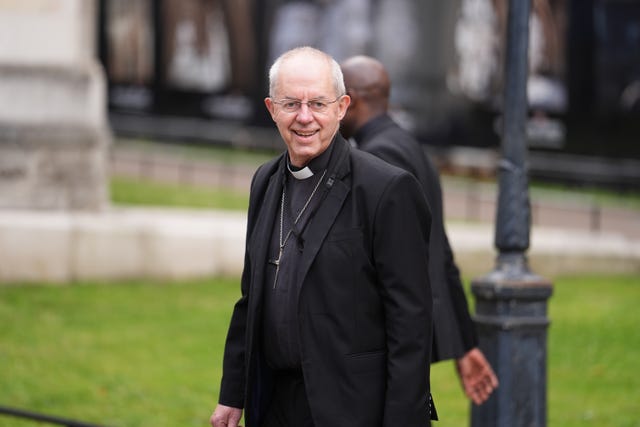The Archbishop of Canterbury is under mounting pressure to quit over his handling of an abuse scandal, with a bishop saying “his position is untenable”.
A petition by some members of the General Synod – the church’s parliament – has gathered more than 5,000 signatures urging Justin Welby to stand down over his “failures” to alert authorities about John Smyth QC’s “abhorrent” abuse of children and young men.
Bishop of Newcastle Helen-Ann Hartley echoed the calls, saying the Church of England risked losing its “moral voice” if the situation persisted.
An independent review into the abuse, published last week, concluded that he might have been brought to justice had the archbishop formally reported it to police a decade ago.
Ms Hartley told the BBC: “I think that it’s very hard for the church as the national, the established church, to continue to have a moral voice in any way, shape or form in our nation when we cannot get our own house in order with regard to something as critically important, something that would be asked of any institution, let alone the church, which is meant to have the gospel of Jesus Christ looking out for the most vulnerable in our midst.
“We are in danger of losing complete credibility on that front.”
Of Mr Welby, she said: “I think, sadly, his position is untenable, so I think he should resign.”
She said while his resignation is “not going to solve the problem”, it would be “a very clear indication that a line has been drawn, and that we must move towards independence of safeguarding”.
After the petition was launched, Mr Welby’s spokesman said he “reiterates his horror at the scale of John Smyth’s egregious abuse, as reflected in his public apology”, repeated that he does not intend to resign, and said he “hopes the Makin Review supports the ongoing work of building a safer church here and around the world”.
Smyth died aged 75 in Cape Town in 2018 while under investigation by Hampshire Police, and was “never bought to justice for the abuse”, the Makin Review published last week said.
Across five decades, Smyth is said to have subjected as many as 130 boys and young men in the UK and Africa to traumatic physical, sexual, psychological and spiritual attacks, permanently marking their lives.
Mr Welby knew Smyth because of his attendance at Iwerne Christian camps in the 1970s, but the review said there was no evidence that Mr Welby had “maintained any significant contact” with the barrister in later years.
It said that while Mr Welby “did have reason to have some concern about” Smyth, this was not the same as suspecting he had committed severe abuse, and concluded it was “not possible to establish” whether Mr Welby knew of the severity of the abuse in the UK before 2013.

The archbishop said he had “no idea or suspicion of this abuse” before 2013 but acknowledged the review had found that after its wider exposure that year he had “personally failed to ensure” it was “energetically investigated”.
The petition says: “Given his role in allowing abuse to continue, we believe that his continuing as the Archbishop of Canterbury is no longer tenable.
“We must see change, for the sake of survivors, for the protection of the vulnerable, and for the good of the church, and we share this determination across our traditions.
“With sadness we do not think there is any alternative to his immediate resignation if the process of change and healing is to start now.”
I cannot see how Justin Welby survives this. His last year and half will be dogged by protests; noone will want him to come and celebrate their anniversary services or ordinations; projects he supports will be damaged by association. It would be desperately painful.
— Marcus Walker (@WalkerMarcus) November 11, 2024
Giles Fraser, vicar of St Anne’s in Kew, west London, told BBC Radio 4’s Today programme: “I’m afraid he’s really lost the confidence of his clergy, he’s lost the confidence of many of his bishops and his position is completely untenable.”
Marcus Walker, rector at St Bartholomew the Great in central London, said: “I cannot see how Justin Welby survives this.”
Mr Welby will reach the church’s retirement age of 70 in 2026, but Mr Walker said: “His last year and half will be dogged by protests; no one will want him to come and celebrate their anniversary services or ordinations; projects he supports will be damaged by association. It would be desperately painful.”
Prime Minister Sir Keir Starmer declined to say whether he thought the archbishop should quit.
He told reporters: “That’s a matter really for the church rather than for me.”






